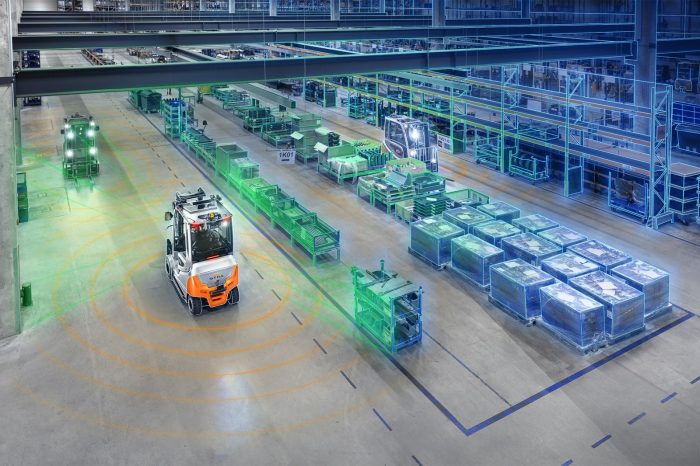“Save” the valuable sensor data

Photo by Still GmbH
When automated guided vehicles (AGVs) navigate through warehouses or production halls, they become true data collectors. Data that is, however, immediately deleted again. “This is a huge waste,” says Bengt Abel, project manager at STILL. The international research project ARIBIC (Artificial Intelligence-Based Indoor Cartography) therefore aims to identify methods with which this valuable information can be used profitably.
The data collected via sensors and cameras can be used in the ARIBIC cloud to create 3D maps of warehouses or production facilities that are always up to date. “Via this current sensor data, we create a living digital twin of the environment and can thus display and share relevant information virtually in real time,” Bengt Abel describes the basic idea of the research project. In contrast to today’s method, where a rigid 3D image of the environment is created after a snapshot, the images generated by the ARIBIC platform remain dynamic and always up-to-date. “As the truck or AGV travels through the environment, its sensors detect even the smallest changes and transmit them to the ARIBIC platform. In the artificial intelligence-based interior mapping, these changes, such as a moved shelf or a newly parked pallet, are immediately taken into account and fed back into the system,” says the STILL expert.
Enormous benefit for users
High-resolution 3D maps with semantic information are needed first of all for the localisation and navigation of automated guided vehicles in their working environment. Operators of warehouses or production halls thus know where their vehicles are at all times. This information, in turn, can be used to optimise warehouse or factory planning. For example, it is clearly recognisable in which areas of the warehouse a lot or little is driven or which aisles are more frequently blocked. With these results, shelves can be (initially) virtually moved or production areas rearranged. Bengt Abel: “Users will be able to optimally plan and utilise their warehouses and production halls in the future with the new possibility of permanently recording the working environment. For the first time, they would get a detailed insight into what is happening in their warehouses in the first place.” According to the STILL expert, countless other fields of application are conceivable that build on the ARIBIC results: “We already have great ideas today. But I am quite sure that there will be many more in the future.”
The ARIBIC project
The ARIBIC project was launched in March this year. It is scheduled to be completed in the fourth quarter of 2023. In addition to the consortium leader STILL, the Karlsruhe Institute of Technology (KIT), the University of Toronto with its STARS laboratory and the Canadian sensor manufacturer LeddarTech are also involved in the international research project. The project is funded by the German Federal Ministry for Economic Affairs and Energy (BMWi) and the Industrial Research Assistance Program of the Canadian National Research Council (NRC IRAP). The Hamburg-based intralogistics supplier STILL will be entering its successful OPX iGo neo model in the race – an autonomous order picker that is already well equipped with sensors and camera technology. “Now our early commitment to automation technology, robotics and digitalisation is paying off. For years we have already been working on a variety of sensor solutions for our industrial trucks, which are now gradually flowing into series production. An important prerequisite for being able to participate in such a project in the first place,” as Bengt Abel emphasises.
For more information, please visit: https://www.still.de/unternehmen/news-presse/news.html
News Categories
- » NEWS HOME
- » Automation & Robotics
- » Industry 4.0
- » Material Handling
- » Sensors
- » Quality & Testing
- » Machine Vision
- » Laser & Optics
- » Metalworking
- » Motion Control & Drives
- » Hydraulics & Pneumatics
- » Process Industry
- » Renewable Energy
- » Agriculture
- » Home & Office Furniture
- » Environmental Tech



